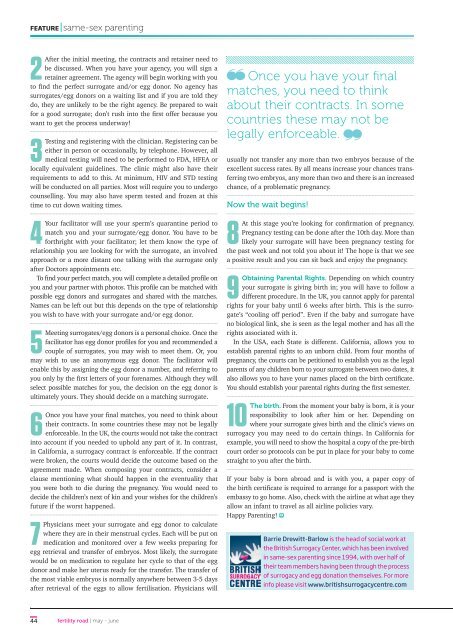Fertility Road Issue 06
Create successful ePaper yourself
Turn your PDF publications into a flip-book with our unique Google optimized e-Paper software.
FEATURE | same-sex parenting<br />
2After the initial meeting, the contracts and retainer need to<br />
be discussed. When you have your agency, you will sign a<br />
retainer agreement. The agency will begin working with you<br />
to find the perfect surrogate and/or egg donor. No agency has<br />
surrogates/egg donors on a waiting list and if you are told they<br />
do, they are unlikely to be the right agency. Be prepared to wait<br />
for a good surrogate; don’t rush into the first offer because you<br />
want to get the process underway!<br />
3Testing and registering with the clinician. Registering can be<br />
either in person or occasionally, by telephone. However, all<br />
medical testing will need to be performed to FDA, HFEA or<br />
locally equivalent guidelines. The clinic might also have their<br />
requirements to add to this. At minimum, HIV and STD testing<br />
will be conducted on all parties. Most will require you to undergo<br />
counselling. You may also have sperm tested and frozen at this<br />
time to cut down waiting times.<br />
4Your facilitator will use your sperm’s quarantine period to<br />
match you and your surrogate/egg donor. You have to be<br />
forthright with your facilitator; let them know the type of<br />
relationship you are looking for with the surrogate, an involved<br />
approach or a more distant one talking with the surrogate only<br />
after Doctors appointments etc.<br />
To find your perfect match, you will complete a detailed profile on<br />
you and your partner with photos. This profile can be matched with<br />
possible egg donors and surrogates and shared with the matches.<br />
Names can be left out but this depends on the type of relationship<br />
you wish to have with your surrogate and/or egg donor.<br />
5Meeting surrogates/egg donors is a personal choice. Once the<br />
facilitator has egg donor profiles for you and recommended a<br />
couple of surrogates, you may wish to meet them. Or, you<br />
may wish to use an anonymous egg donor. The facilitator will<br />
enable this by assigning the egg donor a number, and referring to<br />
you only by the first letters of your forenames. Although they will<br />
select possible matches for you, the decision on the egg donor is<br />
ultimately yours. They should decide on a matching surrogate.<br />
6Once you have your final matches, you need to think about<br />
their contracts. In some countries these may not be legally<br />
enforceable. In the UK, the courts would not take the contract<br />
into account if you needed to uphold any part of it. In contrast,<br />
in California, a surrogacy contract is enforceable. If the contract<br />
were broken, the courts would decide the outcome based on the<br />
agreement made. When composing your contracts, consider a<br />
clause mentioning what should happen in the eventuality that<br />
you were both to die during the pregnancy. You would need to<br />
decide the children’s next of kin and your wishes for the children’s<br />
future if the worst happened.<br />
7Physicians meet your surrogate and egg donor to calculate<br />
where they are in their menstrual cycles. Each will be put on<br />
medication and monitored over a few weeks preparing for<br />
egg retrieval and transfer of embryos. Most likely, the surrogate<br />
would be on medication to regulate her cycle to that of the egg<br />
donor and make her uterus ready for the transfer. The transfer of<br />
the most viable embryos is normally anywhere between 3-5 days<br />
after retrieval of the eggs to allow fertilisation. Physicians will<br />
Once you have your final<br />
matches, you need to think<br />
about their contracts. In some<br />
countries these may not be<br />
legally enforceable.<br />
usually not transfer any more than two embryos because of the<br />
excellent success rates. By all means increase your chances transferring<br />
two embryos, any more than two and there is an increased<br />
chance, of a problematic pregnancy.<br />
Now the wait begins!<br />
8At this stage you’re looking for confirmation of pregnancy.<br />
Pregnancy testing can be done after the 10th day. More than<br />
likely your surrogate will have been pregnancy testing for<br />
the past week and not told you about it! The hope is that we see<br />
a positive result and you can sit back and enjoy the pregnancy.<br />
9Obtaining Parental Rights. Depending on which country<br />
your surrogate is giving birth in; you will have to follow a<br />
different procedure. In the UK, you cannot apply for parental<br />
rights for your baby until 6 weeks after birth. This is the surrogate’s<br />
“cooling off period”. Even if the baby and surrogate have<br />
no biological link, she is seen as the legal mother and has all the<br />
rights associated with it.<br />
In the USA, each State is different. California, allows you to<br />
establish parental rights to an unborn child. From four months of<br />
pregnancy, the courts can be petitioned to establish you as the legal<br />
parents of any children born to your surrogate between two dates, it<br />
also allows you to have your names placed on the birth certificate.<br />
You should establish your parental rights during the first semester.<br />
birth. From the moment your baby is born, it is your<br />
responsibility to look after him or her. Depending on<br />
10The<br />
where your surrogate gives birth and the clinic’s views on<br />
surrogacy you may need to do certain things. In California for<br />
example, you will need to show the hospital a copy of the pre-birth<br />
court order so protocols can be put in place for your baby to come<br />
straight to you after the birth.<br />
If your baby is born abroad and is with you, a paper copy of<br />
the birth certificate is required to arrange for a passport with the<br />
embassy to go home. Also, check with the airline at what age they<br />
allow an infant to travel as all airline policies vary.<br />
Happy Parenting!<br />
Barrie Drewitt-Barlow is the head of social work at<br />
the British Surrogacy Center, which has been involved<br />
in same-sex parenting since 1994, with over half of<br />
their team members having been through the process<br />
of surrogacy and egg donation themselves. For more<br />
info please visit www.britishsurrogacycentre.com<br />
44 fertility road | may - june
















